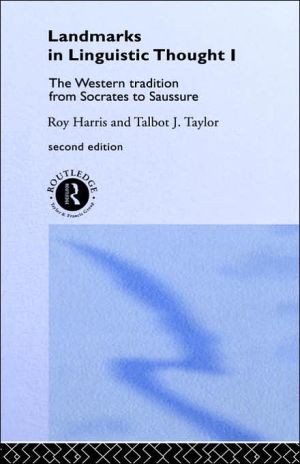

 |

|

The average rating for Landmarks in Linguistic Thought based on 2 reviews is 4.5 stars.
Review # 1 was written on 2014-07-25 00:00:00 Sara Tim Sara TimIn today's science crazed academic world, one frequently runs into the ideology that all thinking that developed prior to the twentieth century is not worth a second look. Linguistics, as the most scientific (or is it scientistic) treatment of language we have, revels in the belief and hope that Chomsky's revolution will bestow on its creator the same mantle of science as was granted to Darwin and Copernicus. Landmarks of Linguistic Thought proffers the meek but irascible cry of 'Not So Fast!' This work by Roy Harris and Talbot Taylor shows that numerous ideologies and prejudices of modern linguistics are not revolutionary but have in fact been a long time a-coming. Landmarks traces the uneven trajectory of philosophical, lexicographical, and anthropological linguistics as it evolved through the millennia of abstract writing and representation in Europe. The book stops at Saussure, the point at which most modern treatments of linguistics begin. Landmarks begins with the Greeks, a fascinating point of origin that is so often ignored by linguists. Throughout this newly rediscovered longue duree of linguistics, one sees consistent elaborations and recurrent anxieties about language. Echos of the Chomskian preoccupation with formal perfection can be discerned in the rhetoric and logic of past rhetoricians and logicians. Although not formalized as mathematically as today's syntax, semantics, morphology, or phonology, Landmarks makes it clear that the core idea of linguistic creativity (as a notion of how the analogical extension of language patterns creates a new matrix of thought) is as old as the hills. Also as with modern linguistics, there has always been in the study of language those who would seek to abolish the ragged edge of grammar which refuses to conform to the accepted pattern. Whereas today we might dispose of aberrant performance data as simply errors or as evidence of an impoverished stimulus, the desire to perfect language during the development of Western thought revealed the same sort of anxiety that the thing won't hold together, that language and its speakers are losing the battle for a sane consistency. Anybody who has ever overheard the speech of anonymous others ("Where you was at?") feels at once a twinge of shoolmarmishness over a linguistic system out of control as well as an appreciation for how pliant and supple--and therefore expressive--our languages can be. I feel this could be an important book if any modern linguist felt compelled to see that what is past is prelude. Modern linguists might not be interested in this book however because of the lack of explicit tie-ins between how language was approached prior to a century ago and how these very same ideologies and anxieties about language still hold sway. It is clear that the authors of Landmarks are not pleased or impressed with the way things are going with linguistics, but I feel they might not be knowledgeable enough about how today's linguists reason. If they were knowledgeable about the tone and timbre of today's linguistics as a whole, it is conceivable that they could have made a tighter and more directed polemic about how the twentieth/twenty-first century linguistic revolution is in many (not immediately obvious) ways either conservative or reactionary. I also wish that non-Western landmarks of linguistic thought were taken into consideration, for example the writings of Panini or Lao Tze. |
Review # 2 was written on 2011-09-25 00:00:00 Daniel Cosgrove Daniel CosgroveThis is a really well-written introduction to Linguistic Thought for two reasons. First, it is lucid and interesting to read. The authors present each thinker with an interesting extract from an important text, and then present the thinker's main standpoint in a way that is neither too simplified nor too academic. Second, it successfully bridges the gap between linguistics and philosophy. Too often, philosophers of language don't bother to consider up-to-date linguistic thought, and likewise many linguists work within their own field and don't bother discussing their work from a philosophical viewpoint. An exception to this trend is of course Noam Chomsky, but his work is not discussed in this book. Both Chomsky and the influential Ludwig Wittgenstein (that I feel every linguist should try to read!) are presented in Volume II in this series, a book I have yet to purchase and read. |
CAN'T FIND WHAT YOU'RE LOOKING FOR? CLICK HERE!!!